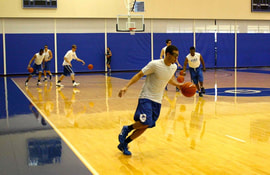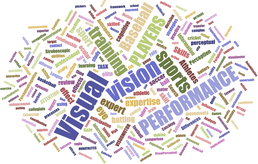Opti Lab Research
|
|
Research in the Human Performance Optimization Lab uses psychometric, neuroimaging, electrophysiological, neurostimulation, and eye tracking approaches to understand the function of the human brain. We use statistical, computational, and experimental approaches to infer meaning from data. These methodologies are applied in clinical, laboratory, and real-world contexts to investigate the brain mechanisms that enable cognition and to develop interventions that speed learning and improve the quality of rehabilitation and therapy. Our 'Big Tent' research adheres to Open Science principles with pre-registered clinical trial, systematic reviews, and meta-analyses with the goal of producing rigorous and impactful science. Specific areas of focus include:
See our Research in Action page for pictures of our team in action
|
Clinical Cognitive Neuroscience
The field of cognitive neuroscience has revolutionized our ability to measure the brain while people behave and think in order to understand how physiology gives rise to psychology. By identifying the processes and mechanisms at work in healthy brains and determining how they are impaired in psychiatric and neurologic patients, we are able to use this knowledge to create better diagnostic tools and more potent treatments. OptiLab research has embraced these goals using fMRI and EEG to measure healthy and dysregulated brain activity and application of targeted forms of Transcranial Magnetic Stimulation (TMS) with the goal of restoring healthy brain dynamics and optimal behavior. Optilab is in the fortunate position of contributing to the research mission of the UCSD Interventional Psychiatry Program where we conduct several important clinical trials addressing disorders of mood. This research has been published in numerous articles including...
- Synaptic plasticity and mental health (Appelbaum et al 2022)
- TMS to enhance memory abilities in older adults (Beynel et al 2019; Beynel et al 2020; Beynel et al. 2020)
- TMS to improve emotional regulation (Powers et al 2020; Beynel et al 2020; 2018 DIBS Germinator)
- TMS treatment of substance use disorder (Young 2020; Addicott 2019; Young, Galla, and Appelbaum, 2021)
- Meta analysis of online rTMS (Beynel et al 2019)
- Systematic review of rTMS effects on fMRI resting-state functional connectivity (Beynel et al 2020)
- Commentary on disparities in interventional psychiatry treatments (Nagra et al 2024)
Learning and Expertise
Humans are remarkable learners! Our ability to acquire new knowledge, skills, and behaviors is a fundamental aspect of what makes us unique as a species. We are able to achieve and master actions as simple as reaching for a cup and as complex as executing a bicycle kick in a soccer match. Across the entire lifespan, our brains are reorganization through neuroplastic change that allows anyone to acquire new skills. At the same time, only a rare few individuals achieve mastery and can perform at the highest levels of human capabilities. A major theme of research in Optilab has been to understand the brain mechanisms and behavioral process that underlie learning. We have been in the unique position to study these questions in both laboratory and real world contexts, and through collaborations with groups including the UCSD Center for the Future of Surgery, USA Baseball, Nike, and the New York Mets we have been able to conduct studies with peak performers in field such as surgery, sports, and music. Examples include:
- Error prediction in robotic surgery (D' Ambrosia et al 2023a; D' Ambrosia et al 2023b)
- Accelerating surgical skill learning (Cox et al, 2020; Liu et al 2020)
- Visual-motor expertise in athletes (Klemish, 2017; Burris et al, 2018; Liu et al 2020; Laby and Appelbaum, 2021)
- Strength, speed, cognitive, and anthropomorphic predictors of baseball performance (Ho et al 2023; Feng et al 2024)
- Vision training in athletes (Appelbaum & Erickson 2016; Liu et al 2020; Appelbaum 2011, Appelbaum 2012)
- Biomarkers of shooting performance in immersive virtual reality (Liu et al 2021; Rao et al, 2018)
- Edited Special Issues:
- Optometry and Vision Science, Special Issue "Visual Function and Sports Performance"
- Frontiers in Human Neuroscience, Research Topic, "Neural Mechanisms of Perceptual-Cognitive Expertise in Elite Performers"
Mechanisms of Cognition
The mechanisms of cognition give rise to the processes of behavior. From a cognitive neuroscience standpoint, we seek to understand how the processes in the brain allow us to perceive, understand, remember and action upon information from the world around us. Research in OptiLab has been at the forefront of developing and testing approaches to quantify behavior during the measurement of body and brain physiology. Examples include:
- The brain mechanism of precise timing (Stoltz et al 2023)
- fMRi BOLD, resting-state and functional connectivity studies of working memory (Davis et al 2018; Crowell et al 2020)
- "Frequency-tagged" EEG to study scene perception (Appelbaum et al 2006; 2008; 2009; 2010; 2012; Norcia et al 2015)
- Reward influences on attention and decision making (San Martin 2013; San Martin 2015)
- The mechanisms of executive control in the brain (Appelbaum et al. 2009; 2012; 2014; Donohue et al 2016; Krebs et al. 2013)
- Multisensory integration (Donohue et al. 2013; Appelbaum et al. 2013)
- Response inhibition (Boehler et al. 2010; 2011; 2012)





